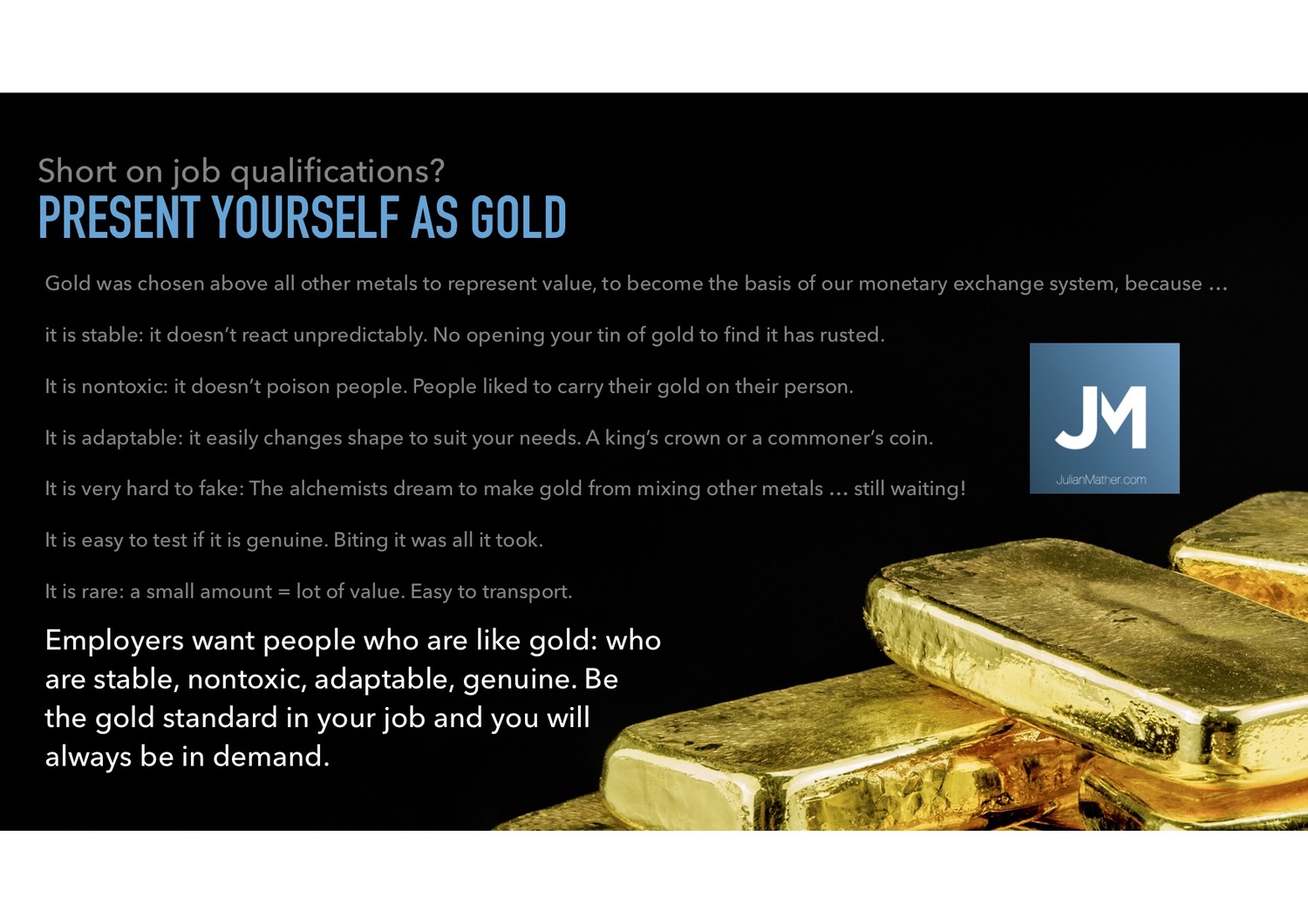Magicians never reveal their secrets. Right?
I’m going to shatter that maxim right now, all in service of challenging another maxim: the most qualified candidate gets the job.
The way a magician vanishes a coin involves deception. Are you deceiving yourself about what is important in your workplace?
Imagine I held a bright silver coin in one hand, slowly put it into my other hand, said a magic word, then opened both my hands to show them clearly empty. How could this bright shiny coin just disappear?
Magicians have an invisible tool bag of techniques. It’s not that big. If you were able to peek inside you’d see a jumble of sleight of hand moves and psychological principles. What you experience as a magic trick is a layering of physical technique – sleight of hand – and psychological technique – sleight of mind.
It’s like one of those deluxe super-size hamburgers with bun, meat, cheese, more meat, salad, more cheese, mayo, meat again, bun. You bite into it, you have a burger experience, but you wouldn’t be able to say exactly what was in it.
One of these psychological techniques we use – I was a professional magician for five years – is called ‘hidden in plain sight’. This is an audacious ploy that is so bald-faced that it is a joy to use.
Magicians will vanish an object then hide it, right in full view, somewhere so obvious, that the audience never thinks of looking there.
Of course, I cannot tell you what actually happens – I swore on a stack of bibles atop Houdini’s grave to hold pure these most important secrets – so let’s make this a purely hypothetical exercise.
Let’s imagine for a moment….
What if?
What if that coin was indeed shiny silver on one side, but the other side had a perfectly cut swatch of fabric glued to it. What if that fabric was the same fabric as the confusing patterned shirt (think paisley) that the magician was wearing. Just think, that coin, with fabric side facing out, would become invisible if laid upon the shirt.
What if the coin was one of a handful of coins in the world, that contains enough steel to make them stick to a magnet. What if you were to put a magnet under your shirt. Well, how convenient, the coin would happily stick there.
What if you made a sleight of hand move when you placed the coin from hand to hand. So tricky is this move that it looks for all the world that you moved the coin from one hand to another. But you didn’t. Just imagine if you allowed the guilty hand – with the hidden coin – to gently brush past the magnet. An inaudible click that you feel but no one hears. Voila! a miracle.
The audience for this seemingly innocent act would be looking at the empty hands *and* they would be looking right at the coin. They would be thinking it has vanished and will now reappear from behind their ear; remember your uncle doing that to you when you were a kid. They will never see the coin brazenly attached to the shirt because they simply aren’t ‘looking’ for it. That coin is effectively ‘hidden in plain sight’.
When we apply for a new job or start a change of careers it can be very confusing.
What are employers looking for? What should I emphasize in an interview?
What about the job you are in right now? Are you not seeing the opportunities right under your nose?
Just like that coin vanished into the pattern of the shirt, simple truths can quickly vanish into the confusion of earnest career advice that fills many career advice blogs and columns. Sometimes these simple truths are so self-evident we discount their importance and look to wordier, more authoritative sounding text. Here is one of those career truths that has become hidden in plain sight.
If you want to be valued, be valuable.
Let’s unpack these eight words. There are a lot of layers. This truly is a deluxe hamburger of a simple truth.
Qualifications are the starting point. You need to be able to tick *most* of the boxes in a job application. If you fall short, press on. Many times job descriptions aren’t accurate. Many times they are made up to reflect the job candidate they think they want. Many times it reflects the previous holder of the now vacant position. That person may well have been overqualified or not particularly well matched for the job anyway. If you feel this is something you would be good at, push on. Skills are not everything and it is up to you to offer up what else you can bring. It is up to you to make yourself appear valuable and that is not as hard or as daunting as it might first read.
Skills make a job, attitude makes a career.
In broad terms being good at your job is not being valuable. Most times they can always find another person with your skills. Skills are a common resource you advertise for. What is rare these days, and hence, ‘valuable’, is an attitude. Great attitude. Attitude to learn, to take risks, to step up and offer more, attitude to improve. So if you want to be valuable at work then work on your attitude above all.
Rarity is not the only measure of value but it is one we can work in our favour. Diamonds and gold hold value because they are in limited supply. Fun fact: all the gold EVER mined would make a cube whose sides are 20m / 67feet long. Iron is removed from the ground by the ton every day. It is easily recycled. Plenty more where that came from so less valuable.

It can be intimidating in the presence of well-qualified people. You can think that they are in another league and you don’t stand a chance. Some jobs this is certainly true. Academia trades in qualifications as a currency.
If you are in a workplace where people work alongside other people, let’s say an office, in the cab of a truck, in the emergency room of a hospital. Anywhere that humans rub shoulders with other humans there is an opportunity for a person with a great attitude to compete with another person with great qualifications. Why? Surely the best qualified wins the day.
This is where it gets scientific…. no one wants to work with a dick.
National surveys of employers [1] show that they value skill sets such as critical thinking and problem solving more than specific majors.
The value of this is easily overlooked This is something many of us don’t think matters when management is hiring. It is. Management is human. They have all the same personal, financial, family stresses. Their stresses may be packaged differently. It’s still good old basic stress though. Management doesn’t want any more stress in their lives as much as you want it. They really don’t want difficult to work with people, regardless of their qualifications. They don’t want people who make them lay awake at night. Life is emotionally taxing enough as it is.
As football coach Vince Lombardi would tell his players, “If you aren’t fired with enthusiasm you will be fired with enthusiasm”
So if you feel a little short on qualifications, offer up your attitude. Present yourself as gold.
Gold was chosen above all other metals to represent value, to become the basis of our monetary exchange system, because …
- it is stable: it doesn’t react unpredictably. No opening your tin of gold to find it has rusted.
- It is nontoxic: it doesn’t poison people. People liked to carry their gold on their person.
- It is adaptable: it easily changes shape to suit your needs. A king’s crown or a commoner’s coin.
- It is very hard to fake: The alchemists dream to make gold from mixing other metals … still waiting!
- It is easy to test if it is genuine. Biting it was all it took.
- It is rare: a small amount = lot of value. Easy to transport.
Employers want people who are like gold: who are stable, nontoxic, adaptable, genuine. Be the gold standard in your job and you will always be in demand.

If this simple truth resonates with you then you have a distinct advantage. For many it will remain hidden in plain sight as they continue to work harder on their horizontal skills, gaining ever more qualifications for jobs that may not be the jobs of the future. I purposely exclude the pilots who will fly any plane I will be on and any surgeon who may operate on me one day. To all of you, I wholeheartedly encourage you to keep working on your hard skills.
One thing you can bank on is most people will not invest the relatively small amount of effort to improve their soft skills, things like improving communication, learning some basic negotiation, some dispute mediation skills, improving your writing. If you are willing to invest relatively small time and effort, you can make yourself stand head and shoulders above the rest.
A little icing on a pretty good tasting cake is these skills are ‘transferable’ skills. You take them with you wherever you go. They work across all industries. They fit in your back pocket yet when you bring them out they can fill a room.
Your hard skills get you in the door, your soft skills can well take you higher. One is not more important than the other. It’s like a knife and fork. Separately they are limited. Together they are amazing.
When you are looking for a job, now is a great time to lead with attitude and stand head and shoulders above the rest.
Sources:
[1] Hart Research Associates, 2013; National Association of Colleges and Employers, 2012


